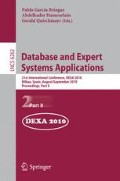Abstract
This paper proposes the concept of generalized sentinel rules (sentinels) and presents an algorithm for their discovery. Sentinels represent schema level relationships between changes over time in certain measures in a multi-dimensional data cube. Sentinels notify users based on previous observations, e.g., that revenue might drop within two months if an increase in customer problems combined with a decrease in website traffic is observed. If the vice versa also holds, we have a bi-directional sentinel, which has a higher chance of being causal rather than coincidental. We significantly extend prior work to combine multiple measures into better sentinels as well as auto-fitting the best warning period. We introduce two novel quality measures, Balance and Score, that are used for selecting the best sentinels. We introduce an efficient algorithm incorporating novel optimization techniques. The algorithm is efficient and scales to very large datasets, which is verified by extensive experiments on both real and synthetic data. Moreover, we are able to discover strong and useful sentinels that could not be found when using sequential pattern mining or correlation techniques.
Access this chapter
Tax calculation will be finalised at checkout
Purchases are for personal use only
Preview
Unable to display preview. Download preview PDF.
References
Agrawal, R., Imielinski, T., Swami, A.: Mining association rules between sets of items in large databases. In: Proc. of ACM SIGMOD, pp. 207–216 (1993)
Agrawal, R., Lin, K.I., Sawhney, H.S., Shim, K.: Fast similarity search in the presence of noise, scaling, and translation in timeseries databases. In: Proc. of VLDB, pp. 490–501 (1995)
Agrawal, R., Srikant, R.: Fast Algorithms for Mining Association Rules in Large Databases. In: Proc. of VLDB, pp. 487–499 (1994)
Agrawal, R., Srikant, R.: Mining Sequential Patterns. In: Proc. of ICDE, pp. 3–14 (1995)
Bosc, P., Pivert, O., Ughetto, L.: On Data Summaries Based on Gradual Rules. In: Proc. of Fuzzy Days, pp. 512–521 (1999)
Brin, S., Motwani, R., Ullman, J.D., Tsur, S.: Dynamic Itemset Counting and Implication Rules for Market Basket Data. In: Proc. of ACM SIGMOD, pp. 255–264 (1997)
Han, J., Kamber, M.: Data Mining Concepts and Techniques, 2nd edn. Morgan Kaufmann Publishers, San Francisco (2006)
Han, J., Pei, J., Mortazavi-Asl, B., Chen, Q., Dayal, U., Hsu, M.: FreeSpan: frequent pattern-projected sequential pattern mining. In: Proc. of KDD, pp. 355–359 (2000)
Lukatskii, A.M., Shapot, D.V.: Problems in multilinear programming. Computational Mathmatics and Mathmatical Physics 41(5), 638–648 (2001)
Middelfart, M.: CALM: Computer Aided Leadership & Management. iUniverse (2005)
Middelfart, M., Pedersen, T.B.: Discovering Sentinel Rules for Business Intelligence. In: Bhowmick, S.S., Küng, J., Wagner, R. (eds.) DEXA 2009. LNCS, vol. 5690, pp. 592–602. Springer, Heidelberg (2009)
Middelfart, M., Pedersen, T.B.: Discovering Sentinel Rules for Business Intelligence. DB Tech. Report no. 24, http://dbtr.cs.aau.dk
Middelfart, M., Pedersen, T.B.: Implementing Sentinel Technology in the TARGIT BI Suite (in submission)
Nakagaito, F., Ozaki, T., Ohkawa, T.: Discovery of Quantitative Sequential Patterns from Event Sequences. In: Proc. of ICDM, pp. 31–36 (2009)
Pei, J., Han, J., Mortazavi-Asl, B., Pinto, H., Chen, Q., Dayal, U., Hsu, M.C.: PrefixSpan: Mining Sequential Patterns by Prefix-Projected Growth. In: Proc. of ICDE, pp. 215–224 (2001)
Pei, J., Han, J., Mortazavi-Asl, B., Wang, J., Pinto, H., Chen, Q., Dayal, U., Hsu, M.: Mining Sequential Patterns by Pattern-Growth: The PrefixSpan Approach. IEEE TKDE 16(11), 1424–1440 (2004)
Srikant, R., Agrawal, R.: Mining Sequential Patterns: Generalizations and Performance Improvements. In: Apers, P.M.G., Bouzeghoub, M., Gardarin, G. (eds.) EDBT 1996. LNCS, vol. 1057, pp. 3–17. Springer, Heidelberg (1996)
Yang, J., Wang, W., Yu, P.S., Han, J.: Mining long sequential patterns in a noisy environment. In: Proc. of ACM SIGMOD, pp. 406–417 (2002)
Zhu, Y., Shasha, D.: StatStream: Statistical Monitoring of Thousands of Data Streams in Real Time. In: Proc. of VLDB, pp. 358–369 (2002)
Author information
Authors and Affiliations
Editor information
Editors and Affiliations
Rights and permissions
Copyright information
© 2010 Springer-Verlag Berlin Heidelberg
About this paper
Cite this paper
Middelfart, M., Pedersen, T.B., Krogsgaard, J. (2010). Efficient Discovery of Generalized Sentinel Rules. In: Bringas, P.G., Hameurlain, A., Quirchmayr, G. (eds) Database and Expert Systems Applications. DEXA 2010. Lecture Notes in Computer Science, vol 6262. Springer, Berlin, Heidelberg. https://doi.org/10.1007/978-3-642-15251-1_3
Download citation
DOI: https://doi.org/10.1007/978-3-642-15251-1_3
Publisher Name: Springer, Berlin, Heidelberg
Print ISBN: 978-3-642-15250-4
Online ISBN: 978-3-642-15251-1
eBook Packages: Computer ScienceComputer Science (R0)

